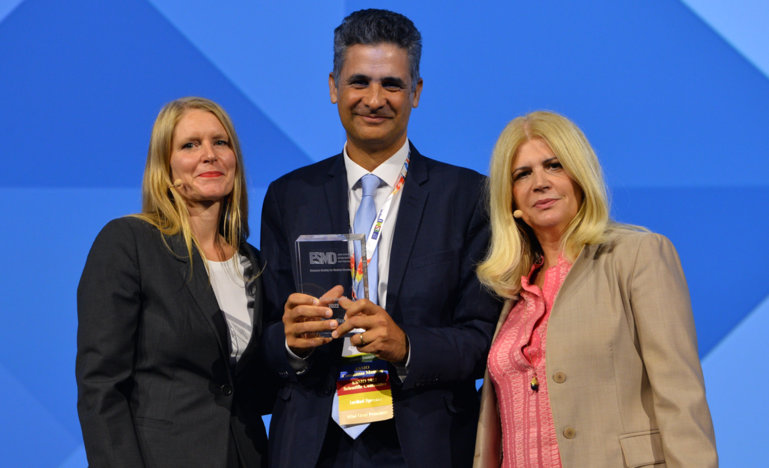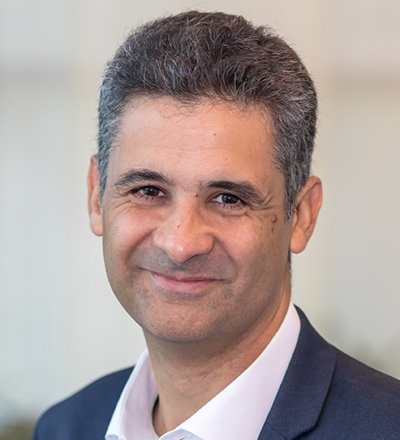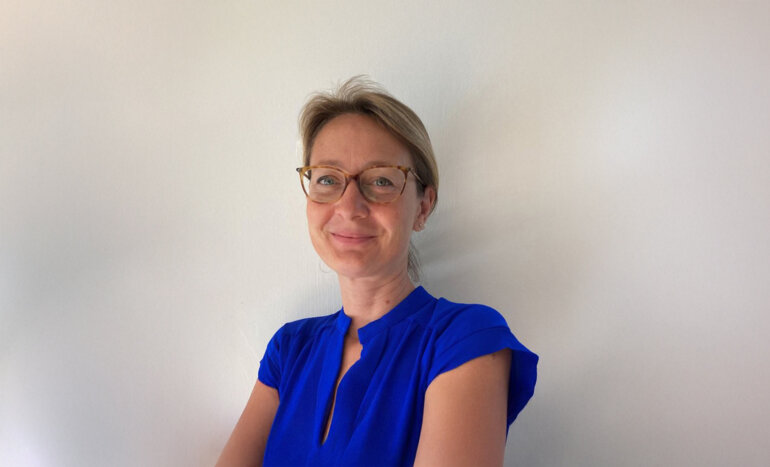Finding the best treatment strategy for patient subpopulations and adequate funding are key to further advancing the field, says ESMO Award 2022 recipient Prof. Karim Fizazi
At ESMO Congress 2022, Prof. Karim Fizazi from Institut Gustave Roussy and University of Paris Saclay, Villejuif, France receives this year's ESMO Award for his pioneering work in the field of prostate cancer and other genitourinary (GU) tumours. Author of many papers who have revolutionised the treatment algorithms for prostate and testicular cancers, here he discusses how the future of GU cancer management will develop.
Your work has been pivotal in prostate cancer with practice-changing studies such as LATITUDE and PEACE-1. What do you consider to be key to achieving real breakthroughs in the field?
Many of my research results have taken years to come to fruition, therefore I believe in perseverance and patience. I was fortunate to lead these two phase III trials, which both established that my hypothesis of upfront intensive therapy would prevent the disease from worsening, becoming more complex and castration resistant, thereby prolonging life. In 2017, the LATITUDE trial was the first to establish the role of next-generation hormone therapy – abiraterone – in addition to conventional hormonal therapy to improve overall and progression-free survival in men newly-diagnosed with metastatic, castration-sensitive prostate cancer (N Engl J Med. 2017;377:352–360). More recently, the PEACE-1 trial demonstrated that triplet therapy comprising androgen deprivation therapy, docetaxel and abiraterone improved overall survival and radiographic progression-free survival in men with de novo metastatic castration-sensitive prostate cancer (Lancet. 2022;399:1695–1707). In parallel, I led the ARAMIS trial, which established the role of the androgen-receptor antagonist, darolutamide, in increasing the duration of metastasis-free survival and overall survival in non-metastatic, castration-resistant prostate cancer (N Engl J Med. 2019;380:1235–1246; N Engl J Med. 2020;383:1040–1049).
Looking back at these achievements, I believe a key strategy of my work has been to endeavour to understand the disease process and to simplify complex mechanisms – that is, to work out the important oncogenic drivers of disease and how these can be targeted. One thing is clear from my time in the oncology field: not all treatment strategies will be effective in all patients and we need to personalise treatment to the specific cancer and the individual patient.
How has the management of other GU cancers evolved so far?
Progress in the treatment of testicular cancer since the 1980s resulted in the cure of the majority of men with localised disease and a large proportion of those with metastatic disease. However, even in the early 2000s there remained a subgroup of men with metastatic disease and a poor prognosis who were at increased risk of cancer relapse and/or death when treated with the contemporary standard triple chemotherapy regimen comprising bleomycin, etoposide and cisplatin (BEP) followed by surgery. Despite numerous randomised clinical trials of alternative regimens, outcomes for these patients with poor-prognosis advanced germ-cell tumours remained bleak. In response, with my research team I started to explore an alternative way of addressing the problem, finding that a decline in the tumour markers alpha-fetoprotein and human chorionic gonadotropin after 3 weeks of chemotherapy was predictive of response to treatment. A subsequent clinical trial established that patients with an unfavourable decline in tumour markers after 3-week BEP chemotherapy had improved progression-free survival with intensified treatment using dose-dense chemotherapy incorporating six agents (Lancet Oncol. 2014;15:1442–1450). Importantly, the risk of death was reduced by 30% in these men receiving dose-dense chemotherapy while the side-effects were reversible. The results of this study were practice changing.
What are the current unmet needs in GU tumours treatment?
In the metastatic castration-sensitive prostate cancer setting, treatment strategies in the past decade have developed to incorporate first one, then two and now three agents, but there remain unmet needs that I believe require an alternative rationale. Rather than adding a fourth agent to the regimen, I think a detailed study of these patients is required to devise the best treatment strategy for the subpopulations. This is the objective of the PEACE-6 platform of randomised trials (PEACE-6-Vulnerable; PRESTO). Different trials within this platform will explore treatments for different subpopulations, for instance, oligometastatic disease, vulnerable patients, such as those in their 80s and 90s, and patients with good or poor responses after several months of systemic therapy. In the latter two groups of patients, it would be useful to determine whether treatment could be de-escalated in good responders, and whether intensive therapy is a good option in patients who have not responded well to their ongoing treatment.
In addition, the search for new targets and new treatments for patients who fail on existing therapies is urgent. My research group is investigating one such novel treatment, ODM-208, a non-steroidal, selective inhibitor of the CYP11A1 enzyme that suppresses the synthesis of all steroid hormones and their precursors. In some patients, a mutated androgen receptor present in tumour cells renders the cells sensitive to other steroid hormones, such as progesterone or glucocorticoids, rather than androgens. Consequently, androgen-targeting agents are ineffective in these patients, but ODM-208 was developed to block steroid hormone production and thus overcome the tumour cells’ resistance mechanism (Abstract 1364MO).
What are the key advances you predict in the next few years?
I think increasingly, there will be a shift to start treatment early for GU cancers in both men and women. The key is to prevent disease relapse, which may be easier when the cancer is localised. In addition, I believe that advanced GU cancer will be treated according to tumour biology rather than cancer type, which reflects the treatment algorithm in other areas of oncology. Unfortunately, funding for treatments is a growing concern. I believe that the countries and companies, many of those represented at the ESMO Congress, alongside politicians, should collaborate to seek pragmatic solutions so that the consequences and conclusions of research are affordable for all patients.
Don’t miss:
Fizazi K. ESMO Award 2022 - Is oncology complex or simple? ESMO Congress 2022
Opening Session, 09.09.2022, h. 12:00 – 13:45, Paris Auditorium







